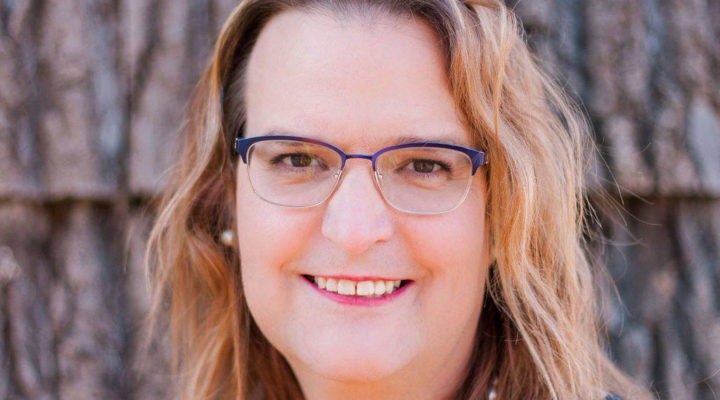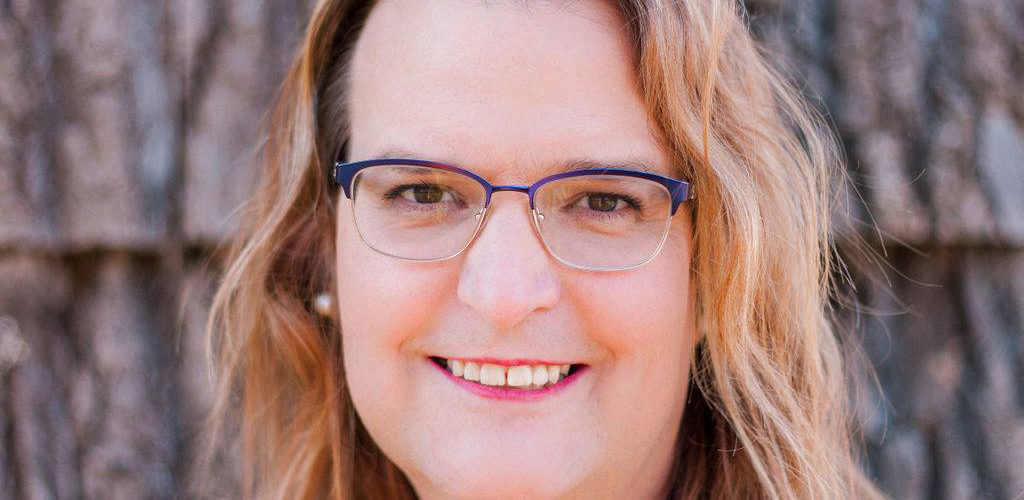Being the first known transgender person ordained by a Cooperative Baptist Fellowship-affiliated congregation, Laura Bethany Buchleiter said she now can live fully into her calling to share the gospel in genuine and counter-cultural ways.
“Where I would start is authenticity, and I think Christ models authenticity for us,” said Buchleiter, 49, who was ordained May 23 at University Baptist Church in Bloomington, Ind. “He was authentically divine and authentically human, and he was so authentic it caught everybody around him off guard.”
In 2014, CBF-affiliated Calvary Baptist Church in Washington, D.C., reaffirmed the ordination of a woman previously ordained as a man, but Buchleiter’s ceremony, which was attended by 40 people including two of her three children, makes her the first known transgender person to be ordained as a minister in a Fellowship church.
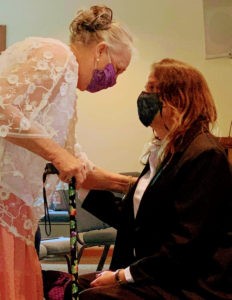
A member of University Baptist Church in Bloomington, Ind. laying hands on Laura Beth Buchleiter during her ordination.
And being ordained as an openly transgender person will make her a more effective minister, University Baptist Pastor Annette Hill Briggs told the Herald-Times newspaper in Bloomington. “It’s a whole lot easier to tell the truth when you’re not hiding a truth. If you’re damming up the truth, the truth won’t get through.”
After all, the congregation ordains people to affirm their callings, not their gender, Briggs added. “Our church self-identifies as a church that listens to the call of the people irrespective of gender or sexual orientation. It’s not relevant to us. We’re not ordaining Laura Beth because she is transgender.”
In Baptist polity, local congregations and not denominational bodies ordain individuals to the ministry. Because ordination is purely a local church matter, CBF does not comment on ordinations, a CBF spokesperson said.
Parsing out gender, sexuality and calling has rarely, if ever, been a linear or tidy experience, Buchleiter said. A gender dysphoria diagnosis in 2006 was met with futile attempts at suppression before coming out to her then-wife in 2014. The couple divorced the following year and her gender affirmation surgery came in 2018.
Through it all, Buchleiter, who was raised in Methodist and Presbyterian settings, was attempting to discern a calling to ministry first sensed in high school. It led her to Moody Bible Institute, a stint in the Christian music industry and eventually to Dallas Baptist University.
But a clear way forward didn’t begin to emerge until a Baptist News Global opinion piece on transgender issues by Mark Wingfield and a friend’s mother turned her onto Wilshire Baptist Church in Dallas in 2016 and, by extension, to CBF.
“For the first time, I was in a more mainstream church that was affirming, or at least open to being affirming,” she said. “It opened my eyes to the possibility of a viable ministry in the church again, which was something I had let go of when I came out.”
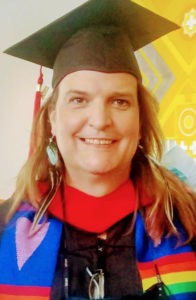
Laura Beth Buchleiter
Buchleiter was able to remain in CBF life through University Baptist Church while attending Christian Theological Seminary in Indianapolis, where she graduated with a master of divinity degree in May.
Now that she is ordained, Buchleiter said she’s preparing for an interim pastorate at a United Church of Christ church in Wyoming that will launch her ministry in pulpit supply and spiritual direction.
“I’ll be doing interim work, but I’m open to the possibility of being a resident queer theologian or queer pastor helping communities shift to open and affirming spaces,” she said.
And while UCC and Disciples of Christ churches are more open to transgender clergy, Buchleiter said she remains active in the CBF Affirming Network and intends to maintain close ties to the Fellowship, whose autonomous congregations take differing stances on LGBTQ clergy.
“A lot of people assume, when they learn I am Baptist, that I am Alliance (of Baptists),” she said, noting she intentionally remains in the Fellowship because of its mixed perspectives on LGBTQ inclusion. “To be in a fellowship where congregations are free to choose, that’s a space where there is both welcome and work to be done.”
Buchleiter’s ordination in a CBF-affiliated church sends an important message not only to the Fellowship but to the wider church and culture, said June Joplin, who was dismissed as pastor of a Canadian Baptist church after coming out as transgender in 2020.
“Maybe there is a kid in the same shoes I was in when I was a hopelessly closeted trans girl in youth group, and who can now see Laura Beth as a role model.”
“It matters because people are watching and some of those people may be trans who are self-accepting or maybe are not out,” said Joplin, who was ordained as a man in 2007 at Westover Baptist Church, a CBF-affiliated congregation in Richmond, Va. “Maybe there is a kid in the same shoes I was in when I was a hopelessly closeted trans girl in youth group, and who can now see Laura Beth as a role model.”
While progress toward that acceptance is slow, Joplin believes it has an inevitable feel to it. “God must know something about this that we don’t, because God keeps moving us into these places and gathering us together to change.”
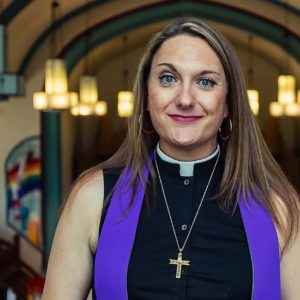
June Joplin (Photo by Laur Bereznai)
And Buchleiter’s ordination is just another example of that movement, said Joplin, who joined the staff of Metropolitan Community Church of Toronto in March. “The Spirit moves where the Spirit will, and apparently the Spirit didn’t check Laura Beth’s pronouns before calling her to ministry.”
Buchleiter said she also has been invited to apply at MCC churches, which are predominantly LGBTQ in membership, but she wants to remain available to help Baptists and other congregations and clergy rethink their views of transgender people.
“I want to answer the call to go places where I can continue to be the question. I don’t want to be a disruptive force, but I do want to be a counter-cultural force,” she said.
Related articles:
Seven things I’m learning about transgender persons | Opinion by Mark Wingfield
Trans 101 for churches: ways to make a difference for transgender persons | Opinion by Susan Shaw and Brenda McComb
Why being transgender is not a sin | Opinion by Mark Wingfield
Church dismisses pastor who came out as transgender in Sunday sermon

